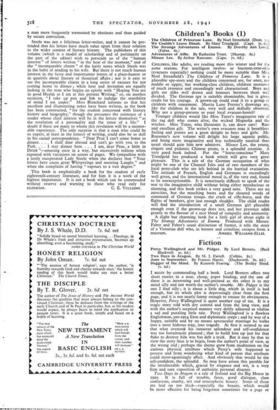Children's Books (1)
CHILDREN, like adults, are reading more this winter and for the same reasons. Tor intelligent twelve- or fourteen-year-olds (evacuees especially) nothing could be more suitable than Miss Noel Streatfield's The Children of Primrose Lane. It is a plausible spy-story and the children concerned are, for once, not middle or upper, but working-class children, children moreover of much resource and exceedingly well characterised. Boys and girls are alike well drawn and honours between them well divided. The German spy is suitably abominable, but is given credit for his courage. A grown-up could read it to a group of children with enjoyment. Marcia Lane Foister's drawings are, like the children in the tale, very well and skilfully observed. Why not a group-present to your local evacuee-hostel?
Younger children would like Miss Tozer's imaginative tale of the rag doll who comes alive; the wicked Magnolia and the witches. Miss Tozer, who illustrates it, can draw cats! Rare and excellent gift. The writer's own evacuees reaa it breathless. Sailing and ponies are a great delight to boys and girls: Mr. Ransome's new volume will delight his large aquatic public, and being more imaginative and less technically nautical than usual should gain him new admirers. Missee Lee, the young, elegant and pedantic Chinese pirate, -is a splendid creation. A very good book indeed. For the "horse-conscious " Mary Treadgold has produced a book which will give very great pleasure. This is a tale of. the German' occupation of what might be one of the Channel Isles and of two members of the local pony-club who are left behind in the hurried evacuation. The attitude of French, English and Germans is exceedingly well given, and the international moral is, ar the very end, found to be unexceptionable. It is notoriously difficult to speak of the war to the imaginative child without being either mendacious or alarming, and this book strikes a very good note. There are no atrocities, but the marching boots and the shouted words of command of German troops, the crash of rifle-butts, and the flights of bombers, give just enough shudder. The child reader will find the int;oductiori of a small German girl plausible enough even if the grown-up does not, and her presence adds greatly to the flavour of a nice blend of sympathy and animosity. A slight but charming bobk for a little girl of about eight is The Strange Adventures of Emma. Produced with Messrs. Faber and Faber's usual distinction of format, it tells the story of a Victorian doll who, in bonnet and crinoline, escapes from a


























 Previous page
Previous page